It serves a wide range of beers from the DDR, plus a couple from Czechoslovakia. The selection includes Berliner Pilsator and Weisse, Wernesgrüner Pils, Radeburger Pils, Pilsener Urquell and Budvar.
The interior is plush, all leather, mahogany and brass. It's obvious that a lot of money was spent on the décor and this is reflected in the prices, which are the most expensive in the DDR at around 6M for half a litre.
Not the place for meeting the locals for only West German tourists can afford to drink here, but worth a visit to sample a slightly wider range of beer.
Walking down Unter den Linden away from the Brandenburg Gate, past the Dom and across the River Spree by the Palast Hotel you come to Spandauer Strasse. Take a right turn and you will come to the Marx-Engels-Forum, a parade of fashionable shops by the Rotes Rathaus.
Here is the Weissbierstube (10-24) a small, new pub specialising in Berliner Weisse. It sells Berliner Pilsator and Weisse, and offers various Weisse cocktails. Its two small rooms are simply furnished and feature some attractive, if rather enigmatic, enamel signs.
Between Spandauer Strasse and the River Spree is the Nikolai Viertiel, a newly-renovated area around the restored Nikolai Kirche. The idea was to recreate some of the old core of the city and, with its mixture of reconstruction and new buildings designed to blend in, it works reasonably well.
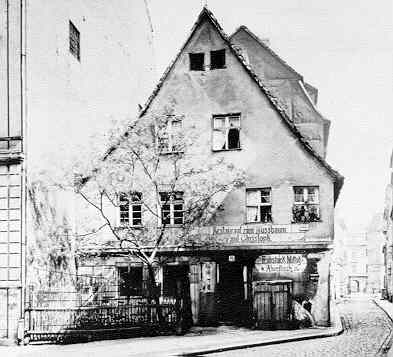 On
Am Nussbaum is on of the reconstructions, Zum Nussbaum (10-24),
which sells Berliner Pilsator, Weisse and Echt Berliner. The original, which
included the artist Zille among its regulars, was built in 1571 but destroyed
by bombing in 1943. The new version has a cosy and reasonably authentic
atmosphere, with several small, rather cramped rooms. It also sells good,
if rather expensive for the DDR, snacks.
On
Am Nussbaum is on of the reconstructions, Zum Nussbaum (10-24),
which sells Berliner Pilsator, Weisse and Echt Berliner. The original, which
included the artist Zille among its regulars, was built in 1571 but destroyed
by bombing in 1943. The new version has a cosy and reasonably authentic
atmosphere, with several small, rather cramped rooms. It also sells good,
if rather expensive for the DDR, snacks.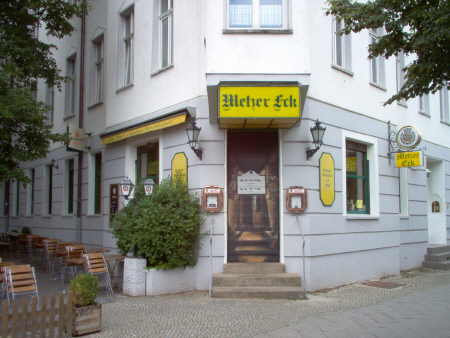 It
is only a short walk to Alexanderpiatz from where you can take the U-Bahn
to Prenzlauer Berg. Take the line in the direction Pankow (Vinetastrasse)
and get off at Senefelderpiatz. This will bring you to within a hundred
metres of the next stopping off point, the Metzer Eck (16-1)
on the corner of Metzerstrasse and Strassbourgerstrasse.
It
is only a short walk to Alexanderpiatz from where you can take the U-Bahn
to Prenzlauer Berg. Take the line in the direction Pankow (Vinetastrasse)
and get off at Senefelderpiatz. This will bring you to within a hundred
metres of the next stopping off point, the Metzer Eck (16-1)
on the corner of Metzerstrasse and Strassbourgerstrasse.The street has the crumbling plaster facades typical of the whole area, but don't be put off by the apparent delapidation, for this is the real Berlin. The Metzer Eck is a small private pub, with a few more personal decorative touches than the standard HO bars, but with the same low prices. Here half a litre of Berliner Pils should cost you just over 1M.
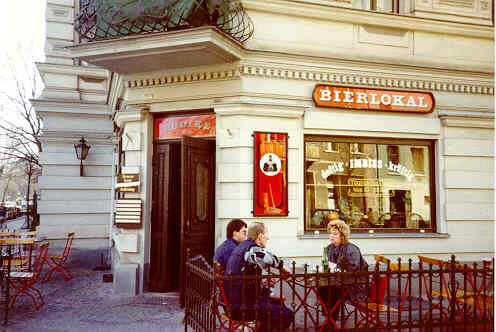 Walking
back along Metzerstrasse and then turning right up Kollwitzerstrasse you
will come to Kollwitplatz. On the opposite side of this pleasant little
square is Husemannstrasse, a street which has been restored to its original
turn-of-the-century appearance. It features a whole array of old shops -
a chemist, a greengrocer and, of course a pub, Budike 15 (10-22)
[Husemanstrasse 15}. It sells Berliner Pilsator, Weisse and Echt
Berliner and has simple wooden furniture.
Walking
back along Metzerstrasse and then turning right up Kollwitzerstrasse you
will come to Kollwitplatz. On the opposite side of this pleasant little
square is Husemannstrasse, a street which has been restored to its original
turn-of-the-century appearance. It features a whole array of old shops -
a chemist, a greengrocer and, of course a pub, Budike 15 (10-22)
[Husemanstrasse 15}. It sells Berliner Pilsator, Weisse and Echt
Berliner and has simple wooden furniture.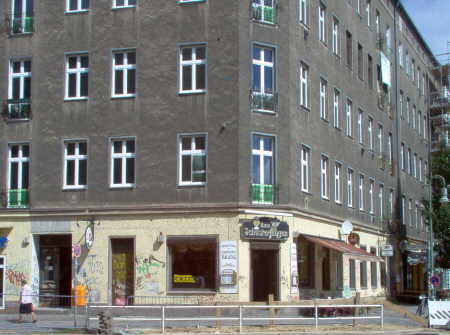 Continuing
along Husemannstrasse, you come to Dirnitroffstrasse [today Danzigerstrasse
R.P]. Turn left and you will come to Zum Hackepeter (Wed-Thu
15-24, Fri-Sun 15-1, Mon-Tue closed). This basic corner local sells
Berliner Pilsator and Weisse, During the 20's this was a Nazi "Stammlokal"
while the pub opposite, Zum Schusterjungen [Danziger Str. 9,10435
Berlin] (11-23), was used by the communists. It is an unpretentious
two-room affair offering Berliner Pils and Weisse and reasonable cheap food.
Continuing
along Husemannstrasse, you come to Dirnitroffstrasse [today Danzigerstrasse
R.P]. Turn left and you will come to Zum Hackepeter (Wed-Thu
15-24, Fri-Sun 15-1, Mon-Tue closed). This basic corner local sells
Berliner Pilsator and Weisse, During the 20's this was a Nazi "Stammlokal"
while the pub opposite, Zum Schusterjungen [Danziger Str. 9,10435
Berlin] (11-23), was used by the communists. It is an unpretentious
two-room affair offering Berliner Pils and Weisse and reasonable cheap food.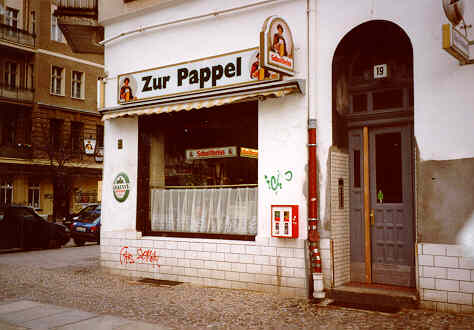 A
little further up Pappelallee, on the opposite side of the street is Zur
Pappel (Mon-Thu 11-21, Fri-Sun 14-24) serving Berliner Pils.
This one-room pub has an impressive old wooden bar and a bizarre balcony
at the rear. The standard 1960's HO tubular steel tables may detract a little
from the charm, but it's still a pleasant enough place in which to drink
a pint or two.
A
little further up Pappelallee, on the opposite side of the street is Zur
Pappel (Mon-Thu 11-21, Fri-Sun 14-24) serving Berliner Pils.
This one-room pub has an impressive old wooden bar and a bizarre balcony
at the rear. The standard 1960's HO tubular steel tables may detract a little
from the charm, but it's still a pleasant enough place in which to drink
a pint or two.On the last side street before the end of Stahlheimerstrasse, is Bräustübl (Mon-Fri 16-24, Sat 9-13, Sun closed) which offers Berliner Pils. Housed in the ground floor of a l920's block of council flats, this consists of a small tap-roorn and another somewhat larger room with waitress service. Despite the rather spartan furnishings, the atmosphere is pleasant enough.
Taking a left along Wisbyerstrasse at the end of Stahlheimerstrasse, it's only 100 metres or so to Feierabendklause (10-22, closed Tue), whose bizarre colour scheme and tatty exterior belie the comfortable pub inside. It has Berliner Pilsator on draught and also offers good, cheap food. Its apparent popularity with the locals means that it can be difficult to find a seat.
Now carry on along Wisbyerstrasse until it meets Schönhauser Allee, where on the corner is Rennsteig (10-24), selling Berliner Pils (the sign outside says Engelhardt). The simple pine furniture with which this substantial pub/restaurant has recently been refurbished gives it a cosy welcoming appearance inside.
To return to the city centre, assuming that by now you don't feel like walking it, continue down Schönhauser Allee a few hundred metres and you'll find an U-Bahn station.
I wrote this guide to East Berlin pubs just a couple of months before the fall of the wall. During 1988 and 1989 I had spent a considerable amount of time in the east of the city (Prenzlauer Berg in particular), visiting my future wife. I came to love the crumbling Edwardian splendour around Schönhauser Allee.
The situation this guide describes was to change beyond recognition within a very short period of time. First came a flood of beer from West Germany, decimating the ouput of all the breweries in the DDR. Privatisation of the brewing industry was conducted with an incompetence that seemed (and arguably was) positively malicious, especially in Berlin.
These are the breweries that were active in East Berlin at the end of 1989:
- VEB Berliner Bürgerbräu
- VEB Berliner Kindl Brauerei
- VEB Brauerei Bärenquell (closed 1994)
- VEB Engelhardt Brauerei
- VEB Getränkekombinat Berlin (Berliner Pilsner Brauerei, founded 1902;
bought 1920 by Kindl and became Berliner Kindl Brauerei Abteilung III;
1945 became a Sovjetischen Aktiengesellschaft (SAG); 1969 became part
of Getränkekombinat Berlin; 1990 (or 1991) bought by Brau
und Brunnen (Kindl); 199? sold to Schultheiss after Kindl had
bought the Potsdamer Rex-Brauerei.
- VEB Schultheiss Brauerei Leninallee
- VEB Schultheiss Brauerei Schönhauser Allee, Abt. Weissbier (home of the classic Berliner Weisse and the first revived Leipziger Gose)
John Amer sent me this report on the state of these pubs in early 2005:
"In your article you didn't put any road numbers in, but I am reasonably certain I didn't miss any pubs. So here goes.
Metzer Eck still there. In some some Berlin tours guide as a good example of a good Kneipe.
Budike 15. If this is number 15 Husemannstrasse, it is now called November and done out in yuppie/ grand cafe style. There also a Irish pub in Husemannstrasse, just called the Irish Pub!
Zum Hackepeter now a Indian Restaurant.
Zum Schusterjungen still there. Front part is still pubby, the back is mainly eating.
Kohlensaure Niederlage unable to find.
Zur Pappel unable to find. [Now called Sergena, Pappelallee 19. R.P.]
Humannklause unable to find.
Braustubl still there. Been refurished, good back street local.
Feirabendklause unable to find. [I think it's now Mauerblümchen, Wisbyer Str. 4. R.P.]
Rennsteig unable to find. "